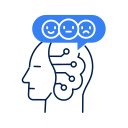Privacy, Safety, and Ethics You Can Trust
Choose tools that plainly explain data collection, storage, and deletion. Look for end-to-end encryption, opt-out options, and transparent policies stated in clear language rather than buried, confusing legal jargon you cannot practically understand.
Privacy, Safety, and Ethics You Can Trust
Seek independent research, clinical advisors, and accessible crisis disclaimers. Avoid tools that promise cures, hide contacts, or pressure you into upgrades before you properly evaluate whether the features actually support your wellbeing goals.






